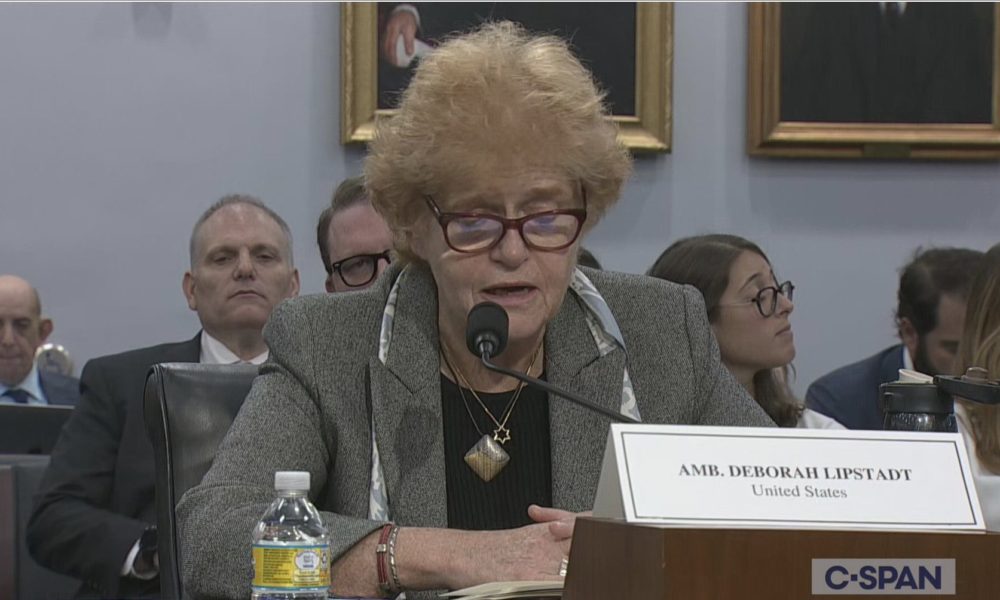Featured Item
Lipstadt acclaimed for calling out denialists

Back in 1996, Deborah Lipstadt was a respected but relatively little-known academic and author noted for her work in the field of modern Jewish history and Holocaust studies.
This changed dramatically in September that year, when she was thrust into the public eye when David Irving launched a libel case against her and her publisher, Penguin Books.
His claim was that she characterised some of his writings and public statements as Holocaust denial in her award-winning 1993 book Denying the Holocaust: The Growing Assault on Truth and Memory.
In that book, Lipstadt referred to Irving as being one of the world’s most dangerous and influential Holocaust deniers, who deliberately distorted the historical record to fit his thesis.
The ensuing trial and unequivocal verdict found Irving, a favourite of pro-Nazi apologists and assorted far-right-wingers worldwide, guilty as charged. It was a watershed event in the battle against Holocaust denial, and made Lipstadt an international figure.
Her subsequent book about the trial became the basis of the 2016 biographical film Denial, in which Lipstadt was portrayed by Rachel Weisz.
Lipstadt will be in South Africa later this year, where she will be the keynote speaker at the South African Jewish Board of Deputies (SAJBD’s) Gauteng Council conference on 10 November.
She last visited the country in 2002, when she spoke at the IUA-UCF campaign launch as well as addressing a capacity audience at Johannesburg’s Linder Auditorium.
The theme of the SAJBD conference this year will be trends and responses to contemporary antisemitism in the local context and globally.
Lipstadt has been the Dorot Professor of Modern Jewish History and Holocaust Studies at Emory University in Atlanta, Georgia, since 1993.
Since the Irving trial, she has been much in demand on the international lecture circuit, combining her growing status as a widely respected public intellectual with the continued pursuit of her career in academia.
This culminated in her appointment by President Joe Biden as United States Special Envoy for Monitoring and Combating Antisemitism on 3 May this year.
Noted for her forthrightness and scholarly rigour, Lipstadt hasn’t shied away from controversy, sometimes being highly critical of trends within the Jewish world which, in her view, misapply or misuse the legacy of the Holocaust.
She has been sharply critical, for example, of the tendency of many Jews and Israelis to compare the upsurge of antisemitism in Europe and the Middle East in recent years to the Holocaust era. She characterises this as “hysteria” and “neuroses” devoid of nuance.
She has also accused previous Israeli administrations of having “cheapened” the memory of the Holocaust by using it to justify going to war. At the same time, she has continued to confront continued manifestations of Holocaust denial and distortion.
This includes calling out not only the outright denialism practised by Irving and his ilk, but the more insidious – and in some ways more dangerous – phenomenon of what she calls “soft-core denial”. In the case of the latter, the true magnitude of the Holocaust and the horrors it constituted is subtly minimised through invalid comparisons with other historical and contemporary events. As an example, she has cited the refusal of groups such as the Muslim Council of Britain to commemorate Holocaust Memorial Day unless equal time is given to anti-Muslim prejudice.
Lipstadt has acquired further renown for championing the cause of Holocaust survivors, including initiatives aimed at recording and preserving survivors’ testimony.
Her later books include History on Trial: My Day in Court with a Holocaust Denier (2005); The Eichmann Trial (2011); and Antisemitism: Here and Now (2019).